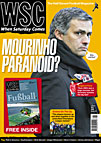 Ashley Shaw visits the theatre to watch I, Keano
Ashley Shaw visits the theatre to watch I, Keano
In I, Keano, an at times hilarious play about the Ireland legend’s bust-up with national coach Mick McCarthy in the lead up to the 2002 World Cup, the former Manchester United captain has inspired the ultimate musical tribute to a career that has been frequently heroic and psychotic in equal measure. Of course, the play is not specifically about the 2002 World Cup at all.
Previously staged in Dublin, I, Keano transferred for a short run at Salford’s Lowry Centre, just over the Ship Canal from Keane’s former stamping ground. Penned by the writers responsible for Father Ted, I, Keano is set in the Roman Empire where a Legion, led by the hapless General McCartacus, is ill-prepared for an impending battle on an island far from home. Keano, the legion’s most decorated warrior, arrives late to discover poor organisation, a lack of equipment and an unhealthy inclination toward sunbathing and free booze. The fear instilled by Keano’s late arrival sends shockwaves through the legion as loyal lieutenants Quinnus and Packybonnerus (played with a nod and a wink toward Jimmy Cricket) seek to patch up the obvious differences between egos on both sides.
This is fine satire, with the Irish squad resembling the villagers in Ryan’s Daughter and Keano the archetypal Angry Young Man seeking to challenge the stereotype. The highlight of the first half, leading up to Keano’s controversial revelations to a scribe, is the appearance of Fergie, the Hairdryer God, whose unintelligible utterances, frantic gum-chewing and homoerotic relationship with Keano were a real crowd-pleaser.
Come the end of the play, Keano has finally flounced out of the squad following McCartacus’s refusal to apologise. And, following the general’s inevitable failure in the war, McCartacus is dealt a sentence worse than crucifixion and sent to Sunderland. His redemption complete, Keano is subsequently persuaded to return to the legion and young Keano and Duffus go on to success with the great man in charge.
Certainly I, Keano makes up for in laughs what it may lack in sophistication, which is no bad thing. Plays about football tend to take it all a bit too seriously and, at one point, I, Keano takes time out to mock the hype surrounding the media outrage at Keane’s bust-up. The Irish origins of the play certainly help in this regard as it’s hard to envisage an English literary figure having quite the same grasp of football personalities as those that shape characters such as Dunphus (the open-neck shirted tree fairy/biographer) and Fergie.
Then again, the issues at stake were deadly serious at the time: should a man abandon his country in its hour of need? Or should professional athletes anticipate first-class facilities no matter what? The war of words between McCarthy and Keane highlighted the continuing struggle between the old and the new – the difference between Irishmen from the diaspora up for the craic and Keane’s expectation that the Republic would approach a challenge such as the World Cup in the manner his club would.
Perhaps the captain’s timing was wrong (although his views may not have carried as much weight at any other time), but his sentiments were certainly correct – the Irish could no longer regard themselves merely as gatecrashers at football’s top table. Ultimately the play makes clear that in the long term Keane’s view has to win out even if his unsubtle approach divided the country and rubbed many supporters up the wrong way. There’s little doubt, either, that Keane would be a messianic figure in the role Steve Staunton now occupies; he might even convince the Irish to take themselves seriously as a football nation and scrap the grandfather rule.
As for the writers of I, Keano, they might just have tapped into a rich seam here. Suggestions for further plays about key characters in football history might include a piece set in Tsarist Russia in which an explorer with an inferiority complex seeks self-justification through world domination. If I, José ever comes to the stage, be sure to book a ticket.
From WSC 231 May 2006. What was happening this month